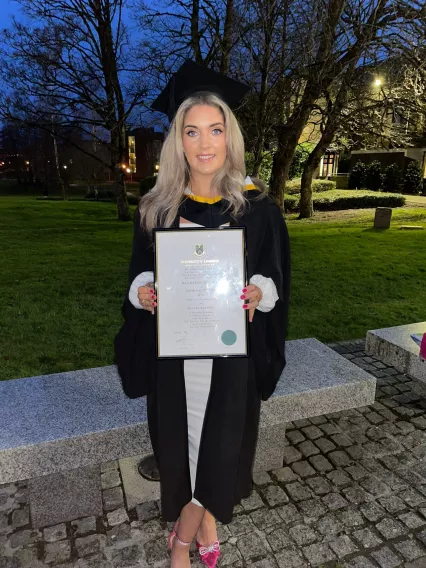Key Info
Bachelor of Arts in Criminal Justice
About you
Are you interested in crime and the operation of the criminal justice system? Would you like to work in law enforcement, security, court administration or other civil service roles or in non-governmental organisations related to the criminal justice sector?
Students of the BA (Criminal Justice) have an inquiring mind and want to develop a grounding in a number of key disciplines in order to fully comprehend the complexities of crime and justice in modern society.
Why study Criminal Justice at UL?
Become an expert in Criminal Justice. The BA (Criminal Justice) is administered by the School of Law which boasts considerable expertise in the criminal justice area. The Centre for Crime, Justice and Victim Studies was established at the School of Law in 1997 and is a national centre of excellence for criminal justice research. Students of criminal justice in the University of Limerick will thus be taught by experts in the area who have published widely both nationally and internationally on criminal justice topics. The expertise of these staff is complemented by the first class credentials of the teaching faculty from the other disciplines (i.e. Sociology, Politics, Public Administration, Psychology and Management) which contribute to the programme.
As a result of its strong research profile in criminal justice areas, the School of Law has developed important links with key criminal justice stakeholders. The School of Law provides accreditation and quality assurance for the national Garda training programme (BA in Applied Policing) in Templemore. Researchers from the Centre for Crime, Justice and Victim Studies have also been involved in research with the Inspector of Prisons, the Irish Prison Service and the Department of Justice. These links ensure that the School of Law is always at the cutting edge of developments in the criminal justice system.
Learn more about our courses and upcoming events
What you will study
The BA (Criminal Justice) is a four-year, inter-disciplinary degree programme. In each semester, you will study a combination of modules from Law, Sociology, Politics and Public Administration. An exposure to each of these disciplines ensures that you will develop a comprehensive understanding of the criminal justice system and how it reacts to and regulates the society within which it operates. To further enhance your learning during the programme, you will study some Psychology modules which will aid in understanding human behaviour and the motivations of those who commit crime along with the behaviours of other actors in the criminal justice system such as police, judges and juries. Modules in Management will also give you core skills which are essential for future administrative roles within the criminal justice sector.
A key learning experience within the programme is the eight-month co-operative work placement which you will undertake at the end of Year 2. Co-op will give you a unique and invaluable opportunity to gain practical experience working in social impact and community work placements. Through these placements, you will put your learning to practical use and build networks with potential future employers. It is also possible to spend some of this work placement period abroad.
| Semester 1 | |
| LA4001 |
Legal System and Method
|
| LA4211 | Criminal Law 1 |
| SO4001 | Intro to Sociology I |
| PA4001 | Introduction to Public Administration I |
| PO4051 | Introduction to Politics and International Relations I |
| Semester 2 | |
| LA4032 |
Criminal Procedure |
| LA4222 | Criminal Law 2 |
| SO4032 | Intro to Sociology II |
| PA4022 | Introduction to Public Administration II |
| PO4052 | Introduction to Politics and International Relations II |
| Semester 3 | |
| LA4430 | Constitutional Law 1
|
| LA4068 | Crime and Criminal Justice |
| SO4073 | Classic Sociological Theory |
| PA4023 | Leadership for the 21st Century |
| PO4013 | Government and Politics of Ireland |
| Semester 4 | |
| LA4440 |
Constitutional Law 2 |
| LA4042 | Administrative Law |
| SO4036 | Contemporary Sociological Theory |
| PM4022 | Principles of Organisational Behaviour |
| PO4015 | Government and Politics of the EU |
| Semester 5 |
| Co-operative Work Placement |
| Semester 6 | |
| LA4040 |
Law of Evidence |
| LA4058 | Human Rights |
| SO4078 | Inequality and Social Exclusion |
| SO4006 | Sociology of Crime, Deviance and Social Control |
| PA4047 | Comparative Public Policy |
| Semester 7 | |
| LA4021 | Child Law |
| LA4017 | Advanced Lawyering 1 (Alternative Dispute Resolution) |
| MG4045 | Change Management |
| PS4031 | Psychology and Everyday Life |
| LA4033 | Law of the European Union 1 |
| Semester 8 | |
| LA4002 | Jurisprudence |
| LA4109 | Law and Criminology |
| PA4008 | Public Policy and the Environment |
| PS4032 | Psychology and Social Issues |
| LA4044 | Law of the European Union 2 |
Frequently Asked Questions
The number of places offered on the BA(Criminal Justice) varies from year to year.
The four-year programme includes seven semesters on campus and six to eight months on work placement (which includes one semester of study (i.e. autumn semester of third year)). The programme is a structured one. There are no elective modules (i.e. modules you choose). Instead, you will study a predetermined set of modules primarily from the disciplines of Law, Sociology, Politics and Public Administration each semester. There will also be some modules from Psychology and Management within your degree.
At the end of year 2 (June to January), students on the BA(Criminal Justice) will complete an eight-month period of Cooperative Education (i.e. work placement) which provides the students with an opportunity to apply the knowledge that has already been acquired. Normally this will take the form of a work placement which is relevant to the programme such as within the Courts Service, local authorities, law firms or community and non-governmental organisations. Each year, there will also be some opportunities to spend this time abroad. This will depend on the opportunities which are available in any given year.
The body responsible for training solicitors. the Law Society of Ireland, does not require applicants to have a law degree to pursue a career as a solicitor. However, every student in the country must sit entrance exams to gain entry to the Law Society of Ireland. Thus, if you wish to become a solicitor, you may apply to the Law Society and complete the relevant entrance examinations with a BA(Criminal Justice) degree.
The body responsible for training barristers, the Honourable Society of Kings Inns, requires students wishing to become a barrister to hold an approved law degree. The BA(Criminal Justice) is not approved for this purpose. Thus, if you wish to become a barrister, you will need to complete an approved law degree before applying.*
BA(Criminal Justice) graduates who wish to pursue a career in the legal profession are eligible to complete the LLB(Graduate Entry) law programme within the School of Law. Importantly, BA(Criminal Justice) graduates can complete this degree in one year instead of two, thereby obtaining a law degree within one year of completion of the BA(Criminal Justice). This will be an important option for graduates who wish to train as a solicitor and also allows those who wish to pursue a career as a barrister to complete an approved law degree in one year. Further details on the LLB(Graduate Entry) programme are available on the Graduate and Professional Studies website.
*NOTE: Further information on becoming a barrister is available from Kings Inn website and on becoming a solicitor is available on the Law Society website
Yes, please see the relevant information on admissions.
Entry requirements
| CAO points history |
379
|
|---|---|
| Minimum grades |
Applicants are required to hold at the time of enrolment the established Leaving Certificate (or an approved equivalent) with a minimum of six subjects which must include: Two H5 (Higher level) grades and Four O6 (Ordinary level) grades or four H7 (Higher Level) grades. Subjects must include Mathematics, Irish or another language, and English. Note: Grade F6 in Foundation Mathematics also satisfies the minimum entry requirements. Foundation Maths is not reckonable for scoring purposes. For certain electives, additional special qualifications specific to individual subjects or disciplines may be determined by the respective departments in accordance with Academic Council regulations. |
| Subject requirements |
For certain electives, additional special qualifications specific to individual subjects or disciplines may be determined by the respective departments in accordance with Academic Council regulations. |
| Additional considerations |
Mature StudentsWe welcome applications from Mature Students. Mature applicants must apply through the Central Applications Office (CAO) by 1 February. Application information for mature student applicants QQI EntryCertain QQI Awards are acceptable in fulfilling admission requirements for this programme. Visit the UL Undergraduate Admissions QQI site for a full list of modules. |
| Non-EU Entry Requirements |
|
How to apply
| Where are you applying from? | How to Apply |
|---|---|
| Ireland | Irish students must apply to UL via the CAO. More information can be found here. |
| The UK | Students who have completed their A-Levels can apply to UL via the CAO. More information can be found on the Academic Registry website. |
| The EU | EU students can apply to UL via the CAO. More information can be found on the Academic Registry website. |
| Non-EU country | If you are outside of the EU, you can apply for this degree here. |
Fees and funding
Student course fees are broken into three components - Student contribution, Student Levy and Tuition Fees.
A number of illustrative examples of fees for this course based on the current fee levels have been set out in the tables below.
An explanation of the components, how to determine status and the criteria involved is provided below the examples as is a list of possible scholarships and funding available.
EU Students with Free fees status in receipt of a SUSI grant
| HEA pays | Tuition Fees | €2,558 |
| SUSI pays | Student contribution | €3,000 |
| Student pays | Student Levy | €102 |
| Total | €5,660 |
EU Students with Free fees status not in receipt of a grant
| HEA pays | Tuition Fees | €2,558 |
| Student pays | Student contribution | €3,000 |
| Student pays | Student Levy | €102 |
| Total | €5,660 |
Students with EU fee status not in receipt of a grant
| Student pays | Tuition Fees | €2,558 |
| Student pays | Student contribution | €3,000 |
| Student pays | Student Levy | €102 |
| Total | €5,660 |
Non-EU Students
| Student pays | Tuition Fees | €16,798 |
| Student pays | Student Levy | €102 |
| Total | €16,900 |
Student course fees are comprised of the following components:
Student Contribution
Annual charge set by the government for all full-time third level students. All students are liable unless they have been approved for a grant by Student Universal Support Ireland (SUSI). Please refer to https://www.studentfinance.ie to determine your eligibility for a grant and for instructions on how to apply. The current student contribution is set at €3000.
Student Levy
All students are liable to pay the Student Levy of €102. Please note the Student Levy is not covered by the SUSI Grant.
Tuition Fees
These are based on Residency, Citizenship, Course requirements.
Review the three groups of criteria to determine your fee status as follows
-
Residency
- You must have been living in an EU/EEA member state or Switzerland for at least 3 of the 5 years before starting your course
-
Citizenship
- You must be a citizen of an EU/EEA member state or Switzerland or have official refugee status
-
Course Requirements
(all must be met)
- You must be a first time full-time undergraduate (Exceptions are provided for students who hold a Level 6 or Level 7 qualification and are progressing to a Level 8 course in the same general area of study).
- You must be undertaking a full-time undergraduate course of at least 2 years' duration
- You cannot be undertaking a repeat year of study at the same level unless evidence of exceptional circumstances eg serious illness is provided (in which case this condition may be waived)
Depending on how you meet these criteria your status will be one of the following -
- Free Fee Status: You satisfy all three categories (1, 2 and 3) and therefore are eligible for the Higher Education Authority’s Free Fees scheme.
- EU Fee Status: You satisfy both the citizenship and residency criteria but fail to satisfy the course requirements and are liable to EU fees.
- Non EU Fee Status: You do not meet either the citizenship or residency criteria and are therefore liable to Non EU fees.
More information about fees can be found on the Finance website
These scholarships are available for all courses
| Title | Award | Scholarships Available |
|---|---|---|
| All Ireland Scholarships - sponsored by J.P. McManus | €6,750 | 125 |
| Brad Duffy Access Scholarship | €5,000 for one year | 1 |
| Bursary for my Future Scholarship | €2,750 one off payment | 4 |
| Civic Engagement Scholarship | €1500 | 1 |
| Cooperative Education Award | 1 medal per faculty | |
| Elaine Fagan Scholarship | €1,500 | |
| Financial Aid Fund | ||
| Hegarty Family Access Scholarships | €5,000 for one year | 2 |
| Higher Education Grants & VEC Grants | ||
| Irish American Partnership Access Scholarships | €5,000 | 2 |
| Paddy Dooley Rowing Scholarship | €2,500 | |
| Plassey Campus Centre Scholarship Programme | ||
| Provincial GAA Bursaries Scheme | €750 | |
| Stuart Mangan Scholarship | ||
| The Michael Hillery and Jacinta O’Brien Athletics Scholarship | Various benefits equating to over €7,000 in value | |
| UL Sports Scholarships | Varies depending on level of Scholarship | Multiple |
Your future career
The BA (Criminal Justice) prepares students for a wide variety of careers within the criminal justice sector and beyond. Graduates may opt for careers in policing, the legal profession, the private security industry, courts administration or the prison service, as well as within organisations which work in the prevention of crime and/or the support of victims and communities affected by criminal activity. You may also decide to pursue careers in related areas such as the civil service, research or journalism.
Follow on study
Students who complete the BA (Criminal Justice) have a variety of options for postgraduate study and professional education courses both within the University of Limerick and beyond. Importantly, BA(Criminal Justice) graduates are eligible to complete the School of Law’s LLB (Graduate Entry) programme in one year instead of two.
This programme allows individuals with an undergraduate degree in any discipline to obtain a law degree in two years. However, BA(Criminal Justice) students will have sufficient credits in law to complete the LLB (Graduate Entry) programme in one year, thereby obtaining a law degree in one year after completion of the BA(Criminal Justice). This is an ideal postgraduate option for graduates who wish to pursue a career within the legal profession.
Graduates on the programme may also opt to complete the MA in Criminal Justice and Human Rights offered by the School of Law.
Alternatively, you may decide to choose a career in the legal profession or policing and pursue professional education and training for acceptance into these professions
Graduate profile

Olivia Barrett
I’ve had an interest in law since the age of 15 but wasn’t sure exactly which course to study. I chose Criminal Justice because of its broadness. Rather than just sticking to the law modules, I was able to study criminology, sociology and psychology too.
In terms of my favourite aspects of the course, I definitely enjoyed criminal law and criminology. You study how the entire system works including prison, rehabilitation and victim impact.
My studies have been extremely beneficial to me, not only in the career possibilities it opens up, but also because my understanding of the law was an asset to me at a time of personal tragedy. It meant that I was able to open connections with embassies and Irish consulates when my cousin passed away overseas. The knowledge I had of the justice system and public administration helped in such a practical way to make sure that our family was able to bring him home as soon as possible.
My co-op work placement was hugely impactful; I was placed with Limerick City Council and I wouldn’t be in the job I’m in now without that experience. I am currently a legal intern at Holmes O’Malley Sexton and hope to be a fully qualified solicitor in a few years. In terms of advice to students- I would say that you need to be organised in terms of assignments and reading. Work hard, persevere and don’t be afraid to ask for support if you need it.


